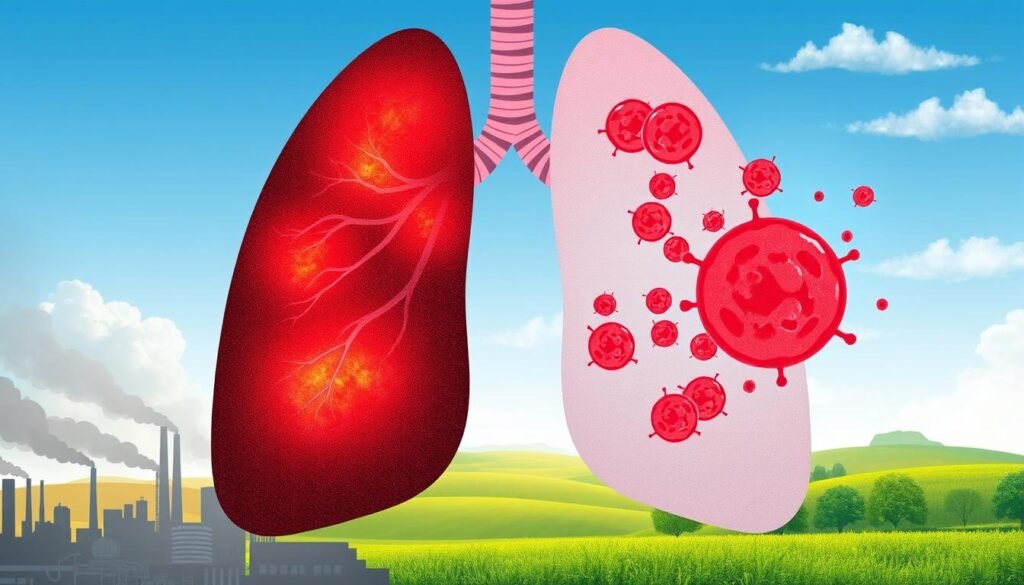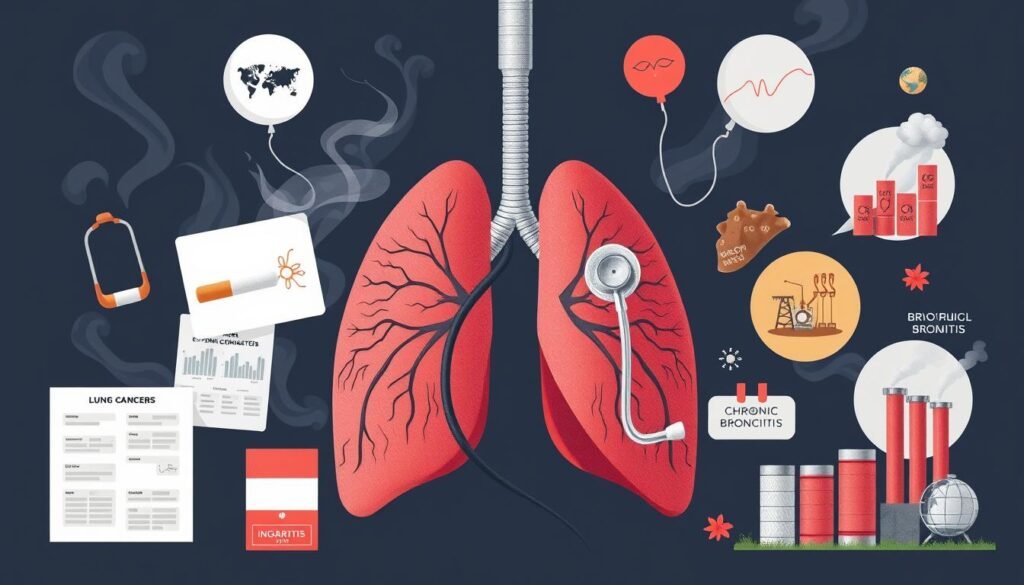Did you know that about 1% of people with chronic obstructive pulmonary disease (COPD) get lung cancer every year? This fact shows a serious link between chronic respiratory diseases and cancer. Chronic bronchitis is a key player here. It’s a common condition where the bronchial tubes in your lungs stay inflamed. This problem doesn’t just make breathing tough. It also sets the stage for harmful changes in lung tissues, which could lead to cancer.
We are diving into the details of how chronic bronchitis is closely linked to lung cancer. This connection is especially seen with COPD. Studies show that having chronic bronchitis could raise your lung cancer risk by 2.5 times. This information is crucial for people living with these conditions and for doctors.
Knowing that chronic bronchitis can lead to lung cancer is key. This knowledge helps in taking steps to prevent it and in making lives better for patients.
Key Takeaways
- Chronic bronchitis is linked to a significantly higher risk of developing lung cancer.
- The annual incidence of lung cancer in COPD patients ranges from 0.8% to 1.2%.
- Chronic bronchitis can increase lung cancer risk by 2.5 times.
- Research indicates that inflammation caused by chronic bronchitis may promote tumor growth.
- Understanding the connection between respiratory disorders and lung cancer is crucial for prevention efforts.
Understanding Chronic Bronchitis
Chronic bronchitis is a long-term problem in the lungs. It’s known by a cough with mucus that lasts for months over two years. It’s important to know the signs early for the right medical help. Common signs are:
- Wheezing
- Shortness of breath
- Chest discomfort
These symptoms can really change how well someone lives. They often come with other tough lung problems.
Definition and Symptoms
Chronic bronchitis means long-lasting irritation in the breathing paths. This irritation causes the airways to get thicker, making it hard to breathe. Knowing this helps in finding the best way to take care of people with this condition.
Causes of Chronic Bronchitis
Many things can cause chronic bronchitis. The main cause is being around irritants for too long. Especially:
- Cigarette smoke
- Air pollution
- Occupational exposures such as dust and chemical fumes
These factors can make breathing issues worse and lead to other health problems. It’s key to avoid these risks early on. You can learn more about chronic bronchitis and related conditions here.
How Chronic Bronchitis Differs from Other Respiratory Disorders
Chronic bronchitis is different from asthma and other lung issues because it can’t be reversed. Asthma can get better and is often tied to allergies. But chronic bronchitis means constant damage from inflammation. This fact is vital for how doctors decide to treat it.
Link Between Chronic Bronchitis and Lung Cancer
Having chronic bronchitis greatly increases your chance of getting lung cancer. There’s a clear connection between the two, showing why people with lung issues should be careful. It’s key to keep an eye on lung health if you’ve got chronic conditions.
Research Overview on Lung Cancer Risks
Many studies have looked into how chronic bronchitis can lead to lung cancer. One study with over 12,000 lung cancer patients showed that chronic bronchitis makes lung cancer more likely. This is true even when other lung problems are considered. Factors like smoking add to the risk if you already have chronic bronchitis. COPD plays a part too. It shows that bad lung function can increase cancer risks.
Impact of Chronic Bronchitis on Lung Cancer Development
Chronic bronchitis plays a big role in lung cancer’s development. About 1 in 100 people with COPD get lung cancer yearly. This link means a higher risk for those with chronic bronchitis. Managing chronic bronchitis can help. It lowers inflammation and helps lung health.
Making good lifestyle choices helps too. Things like avoiding harmful air and eating well are important. For more help with chronic conditions, you can explore additional resources.
| Condition | Annual Lung Cancer Risk (%) | Odds Ratio for Lung Cancer Development |
|---|---|---|
| Chronic Bronchitis | 1.0 | 2.0 |
| Emphysema | 1.0 – 2.5 | 1.9 |
| COPD | 5.0 | 2.5 |
Chronic Bronchitis Increases the Risk of Lung Cancer
Understanding how chronic bronchitis and lung cancer are connected reveals important health risks. Studies show chronic bronchitis raises the chance of getting lung cancer, with men having a 1.33 risk. If someone has chronic bronchitis and emphysema, their risk goes up even more, to 1.50. This fact highlights why it’s crucial to deal with chronic lung problems. Over 65 million people around the world suffer from Chronic Obstructive Pulmonary Disease (COPD).
Stats and Findings from Recent Studies
Research has linked chronic bronchitis with a higher risk of lung cancer. The findings include:
- Both chronic bronchitis and emphysema are closely connected to lung cancer.
- If a man is diagnosed with pneumonia two years before lung cancer, his odds ratio is 3.31.
- Having chronic bronchitis along with emphysema and/or pneumonia shows a stronger link to lung cancer than just chronic bronchitis.
- Between 7% to 19% of people globally have COPD, which shows how widespread this health issue is.
Role of Inflammation in Lung Cancer Development
Inflammation is key to how lung cancer develops in people with chronic bronchitis. Long-term inflammation can cause changes in cells that lead to cancer. This shows the deep connection between inflammation and lung cancer. Knowing about this link can help in creating better ways to manage chronic bronchitis and lower lung cancer risks.
The Role of COPD in Lung Cancer
Chronic obstructive pulmonary disease, or COPD, greatly affects our breathing system. It makes lung cancer risk higher. COPD includes chronic bronchitis and emphysema. It impacts about 251 million people worldwide. This shows it’s a big health issue. Understanding how COPD relates to lung cancer is important. It helps us grasp the disease and its effects on lung cancer risk.
Understanding Chronic Obstructive Pulmonary Disease (COPD)
COPD is a group of lung diseases that make it hard to breathe. People with COPD may cough a lot, make mucus, and have trouble breathing. It’s a big worry in rich countries. Between 8-10% of adults there have it. Smokers have an even higher rate, from 15-20%. COPD causes ongoing swelling in the lungs. This damage can lead to cancer.
How COPD Contributes to Increased Cancer Risk
Studies show that people with COPD and who smoke are much more likely to get lung cancer. Their risk goes up 4 to 6 times, no matter their age or sex. This higher risk comes from things like oxidative stress and ongoing inflammation. COPD patients are much more likely to get lung cancer than those without it.
Environment plays a role too, especially in cities. Pollution increases lung cancer risk. For example, lung cancer risk grows by 14% with every 10 g/m3 increase in fine particles. These points highlight how COPD and lung cancer are connected. They show why it’s critical to be aware and manage these risks.

| Statistics | Details |
|---|---|
| Global Prevalence of COPD | Approx. 251 million people |
| Lung Cancer Incidence for COPD Patients | 4.9 per 1000 person-years |
| Lung Cancer Incidence for Non-COPD Patients | 0.7 per 1000 person-years |
| Increased Risk for Smokers with COPD | 4 to 6 times |
| Direct Health Expenditure in Australia | $929 million per annum |
Smoking-Related Diseases and Their Connection to Lung Cancer
Smoking can seriously harm your health, particularly raising the risk of lung cancer. Diseases linked to smoking, like chronic bronchitis and COPD, have a big effect on your lungs. The smoke from cigarettes fills your body with dangerous substances, causing many health problems.
Impact of Smoking on Respiratory Health
Smoking is bad for your lungs, leading to diseases that affect how well you breathe. When you inhale cigarette smoke, it harms the lining of your airways. This damage leads to constant coughing and a higher chance of getting sick.
It can make asthma worse and cause allergic reactions. Even if you’re healthy, smoking can still hurt you, leading to worse breathing over time.
Statistics on Smoking and Lung Cancer Rates
Smoking is a major reason why lung cancer is so deadly. Each year, more than 1 million people worldwide die from it. Most lung cancer cases are linked to smoking, making it a serious global health issue.
Smoking increases a man’s risk of lung cancer by nearly 90%, and a woman’s risk by 70-80%. Smokers are 30 times more likely to get lung cancer than nonsmokers. In the U.S., lung cancer is a leading cause of cancer deaths in both men and women.
| Statistic | Value |
|---|---|
| Lung Cancer Deaths Worldwide | Over 1 million |
| Cigarette Smoking Risk in Men | Almost 90% |
| Cigarette Smoking Risk in Women | 70-80% |
| Increased Risk for Smokers | Up to 30-fold |
| 5-Year Survival Rate for Lung Cancer | 15% |
| 1-Year Survival Rate for Lung Cancer | 42% |
| Former Smokers Diagnosed with Lung Cancer | Majority of new cases |
Common Risk Factors for Lung Cancer
Understanding lung cancer’s common risk factors is vital. It helps identify people at high risk, especially those with chronic bronchitis. Knowing these factors is important. They greatly impact the chance of getting lung diseases.
Identifying Risk Factors in Patients with Chronic Bronchitis
People with chronic bronchitis share many lung cancer risk factors. But, some risks stand out due to their condition. Key risk factors include:
- Smoking history: Smoking is a major risk for both diseases. The more and longer you smoke, the higher your risk.
- Occupational exposures: Working around a lot of dust, fumes, or chemicals increases your risk.
- Family history: Genetics can make lung cancer more likely if chronic bronchitis runs in the family.
- Environmental factors: Long-term exposure to polluted air can worsen lung conditions and increase cancer risk.
Comparative Analysis with Other Respiratory Disorders
Chronic bronchitis and other respiratory disorders share some risk factors, but differences exist. For example:
| Risk Factor | Chronic Bronchitis | Other Respiratory Disorders |
|---|---|---|
| Smoking | Significant contributor | Common in many disorders |
| Occupational Exposures | Key factor | Relevant but varies by disorder |
| Environmental Pollution | High impact | Common risk |
| Family History | Increases risk | Also significant for some disorders |
Chronic bronchitis patients have a higher risk of lung cancer. This is due to ongoing inflammation and weakened lungs. Understanding these risk factors is crucial. It helps create effective prevention plans.

Managing Chronic Bronchitis to Reduce Lung Cancer Risk
Managing chronic bronchitis well is key to lowering lung cancer risk. Taking care of chronic bronchitis symptoms helps improve lung health, aiding in cancer prevention. Knowing how to treat and prevent it is vital.
Treatment Options for Chronic Bronchitis
Several treatments help with chronic bronchitis, aiming to reduce symptoms and boost lung function. These include:
- Smoking cessation programs to stop tobacco use, which is a main cause of chronic bronchitis.
- Bronchodilator medications that open airways, making breathing easier.
- Anti-inflammatory treatments to reduce lung inflammation, leading to healthier lungs.
- Oxygen therapy for those with severe breathing problems.
- Pulmonary rehabilitation programs for education and support in managing the condition.
- Regular screenings to keep an eye on lung health and spot any issues early.
To learn more about chronic bronchitis treatment, check out this resource.
Preventative Measures for Lung Cancer
Taking proactive steps can help prevent lung cancer, especially in those with chronic bronchitis. Important measures include:
- Healthy lifestyle changes, like eating right and exercising, to boost lung health.
- Reducing exposure to air pollution and workplace hazards.
- Regular screenings, such as low-dose CT scans for those at higher risk, for early lung cancer detection.
- Vaccinations against pneumonia and the flu to prevent infections that could worsen lung conditions.
Combining treatment with preventative steps leads to better health outcomes. Keeping up with regular check-ups and lung health monitoring is crucial for preventing lung cancer in those with chronic bronchitis.
Impact of Airway Obstruction on Lung Health
Chronic bronchitis is a key factor in airway obstruction, affecting lung health greatly. This obstruction happens when air passages get narrowed or blocked. This is usually due to inflammation and mucus, common in chronic bronchitis. Understanding this can shed light on lung cancer risks.
How Chronic Bronchitis Causes Airway Obstruction
In chronic bronchitis, ongoing inflammation changes the bronchial tubes. This leads to more mucus and swelling. These changes can greatly limit airflow, causing obstruction. People with chronic bronchitis often face a chronic cough and trouble breathing. This makes airflow problems worse.
Consequences of Airway Obstruction for Lung Cancer Risk
Studies show a link between airway obstruction and higher lung cancer risk. Those with chronic bronchitis, for example, have a much higher lung cancer risk. It’s vital to watch lung health in these individuals. Airflow problems can make lung cancer more likely. A slight drop in FEV1 can raise lung cancer risk. Regular checks, like low-dose CT scans, are key for those with obstruction. For more, see the latest research on lung cancer and COPD.
Exploring Emphysema’s Relationship with Lung Cancer
Emphysema and chronic bronchitis are both part of COPD, but they affect the lungs differently. It’s important to know these differences to understand how emphysema is linked to lung cancer risks.
Differences Between Chronic Bronchitis and Emphysema
Chronic bronchitis causes inflammation and lots of mucus in the airways. Emphysema, however, damages the alveoli, the small air sacs in the lungs. This key difference affects lung function and cancer risk.
Link Between Emphysema and Increased Cancer Incidence
Studies show that people with emphysema have a higher chance of getting lung cancer. Those with emphysema are 3.8 times more likely to face lung cancer. This is especially true for young people and heavy smokers.
The risk of lung cancer goes up as emphysema gets worse. This highlights its importance in the link between emphysema and lung cancer.
| Population | Relative Risk of Lung Cancer | Additional Notes |
|---|---|---|
| Caucasians with Emphysema | 3.8-fold | Higher risk in younger individuals ( |
| Heavy Smokers (≥40 pack-years) | 4.46-fold | |
| Small-Cell Lung Cancer Cases | 5.62-fold | |
| CT Evaluation (>0% Emphysema) | 2.79-fold | Increased risk compared to controls |
| CT Evaluation (≥10% Emphysema) | 3.33-fold |
To lower the risk of lung cancer in emphysema patients, both conditions need careful treatment. Knowing these links can improve how we manage and reduce lung cancer risks for those with emphysema.
Understanding Pulmonary Inflammation and Lung Cancer
Pulmonary inflammation is key in lung cancer development. It’s often made worse by smoking and pollution. This creates a prime setting for cancer cells to grow. Managing inflammation is crucial to reduce cancer risks.
Inflammation as a Driver for Cancer Progression
Long-term pulmonary inflammation can push cancer forward. It causes changes in lung tissue that may lead to cancer. Inflammation leads to:
- Oxidative stress, harming cells and DNA.
- Altered immune responses, making it hard to fight off bad cells.
- Cell proliferation, raising mutation chances.
Biological Mechanisms Linking Inflammation and Cancer
There are clear links between inflammation and cancer. Inflammation brings about cytokine release and immune cell activity. This activity can kickstart cancer. Abating chronic inflammation is imperative:
- More cell turnover, upping mutation chances.
- Failed cell death control, letting damaged cells linger.
- Starting of pre-cancerous spots, spurred by inflammation.

Conclusion
The evidence shows a strong link between chronic bronchitis and higher lung cancer risk. The risk goes up by 1.52 times for those with chronic bronchitis. This link is important to understand. It shows why we need to focus on preventing chronic bronchitis.
To lower lung cancer risk, managing chronic bronchitis symptoms is key. Quitting smoking, getting regular check-ups, and following the right treatments help a lot. These steps can make a big impact on one’s health and lower the risk of serious lung issues.
Chronic illnesses like COPD, chronic bronchitis, and lung cancer pose a big public health problem. But, by focusing on prevention and good management, we can reduce lung cancer numbers. This also helps improve life for those affected.